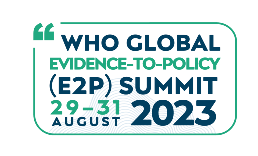Collaboration is the key to unlocking the potential of E2P initiatives, but choosing partners, establishing common ground and sustaining the productive collaboration can be challenging. Join us as we explore the power of cross-evidence ecosystem collaboration and share insights on how to strengthen partnerships for more effective evidence-informed health decision-making.
The session will discuss the importance of identifying opportunities, frameworks, and good practices that can support the institutionalization of collaboration and partnerships at various levels. By sharing experiences, insights, and best practices, speakers will contribute to building a collective understanding of how to strengthen collaboration within the evidence ecosystem, aiming to lead to more effective and efficient use of resources for evidence-informed health decision-making both at national and global level.
Key questions and session highlights
What is the importance of strengthening collaboration in the cross-evidence ecosystem?
How to build and sustain stronger collaboration – in-house and at the country level? What are the frameworks and networks that can help?
![]()
Interactive session
Cross-evidence ecosystem collaboration that advances E2P
This session aims to foster knowledge exchange, inspire collective action, and contribute to advancing evidence-informed policy-making by harnessing the power of collaboration and partnerships. Participants will identify themselves as evidence user, producer, intermediary or funder to share positive experiences where collaboration or partnership between stakeholders or organizations across evidence ecosystem has strengthened the science-policy-decision-making interface at the country or global level, such as evidence-informed policies and programmes. Participants will also be engaged in a discussion around the main challenges and collective actions that could support cross-evidence collaboration.
The insights from the session will be captured using a real-time collaborative web platform.
Key questions and session highlights
- What are positive experiences where collaboration or partnership between stakeholders or organizations across evidence ecosystem has strengthened the science-policy-decision-making interface?
- What are some of the main challenges perceived in the partnerships/collaborations and how can these barriers be overcame?
- How can the evidence community support cross-evidence partnerships/collaborations?








